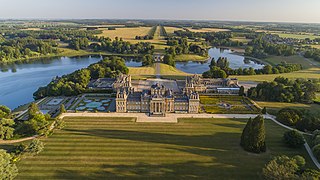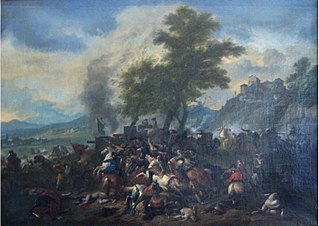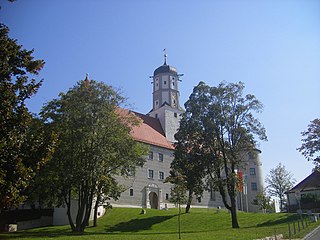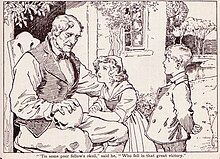
The Battle of Blenheim fought on 13 August [O.S. 2 August] 1704, was a major battle of the War of the Spanish Succession. The overwhelming Allied victory ensured the safety of Vienna from the Franco-Bavarian army, thus preventing the collapse of the reconstituted Grand Alliance.

Duke of Marlborough is a title in the Peerage of England. It was created by Queen Anne in 1702 for John Churchill, 1st Earl of Marlborough (1650–1722), the noted military leader. In historical texts, unqualified use of the title typically refers to the 1st Duke. The name of the dukedom refers to Marlborough in Wiltshire.

Robert Southey was an British poet of the Romantic school, and Poet Laureate from 1813 until his death. Like the other Lake Poets, William Wordsworth and Samuel Taylor Coleridge, Southey began as a radical but became steadily more conservative as he gained respect for Britain and its institutions. Other romantics such as Byron accused him of siding with the establishment for money and status. He is remembered especially for the poem "After Blenheim" and the original version of "Goldilocks and the Three Bears".

General John Churchill, 1st Duke of Marlborough, 1st Prince of Mindelheim, 1st Count of Nellenburg, Prince of the Holy Roman Empire, was an English soldier and statesman. From a gentry family, he served as a page at the court of the House of Stuart under James, Duke of York, through the 1670s and early 1680s, earning military and political advancement through his courage and diplomatic skill. He is known for never having lost a battle.

Blenheim Palace is a country house in Woodstock, Oxfordshire, England. It is the seat of the Dukes of Marlborough and the only non-royal, non-episcopal country house in England to hold the title of palace. The palace, one of England's largest houses, was built between 1705 and 1722, and designated a UNESCO World Heritage Site in 1987.

Sarah Churchill, Duchess of Marlborough, Princess of Mindelheim, Countess of Nellenburg, was an English courtier who rose to be one of the most influential women of her time through her close relationship with Anne, Queen of Great Britain. The Duchess of Marlborough's relationship and influence with Anne were widely known, and leading public figures often turned their attentions to her, hoping for favour from Anne.

Lieutenant-Colonel Charles Richard John Spencer-Churchill, 9th Duke of Marlborough,, styled Earl of Sunderland until 1883 and Marquess of Blandford between 1883 and 1892, was a British soldier and Conservative politician, and a close friend of his first cousin Winston Churchill. He was often known as "Sunny" Marlborough after his courtesy title of Earl of Sunderland.

Robert Tannahill was a Scottish poet of labouring class origin. Known as the 'Weaver Poet', he wrote poetry in English and lyrics in Scots in the wake of Robert Burns.

John Albert Edward William Spencer-Churchill, 10th Duke of Marlborough,, styled Marquess of Blandford until 1934, was a British military officer and peer.

The Battle of Schellenberg took place on 2 July 1704 during the War of the Spanish Succession. The engagement was part of the Duke of Marlborough's campaign to save the Habsburg capital of Vienna from a threatened advance by King Louis XIV's Franco-Bavarian forces ranged in southern Germany. Marlborough had commenced his 250-mile (400 km) march from Bedburg, near Cologne, on 19 May; within five weeks he had linked his forces with those of the Margrave of Baden, before continuing on to the river Danube. Once in southern Germany, the Allies' task was to induce Max Emanuel, the Elector of Bavaria, to abandon his allegiance to Louis XIV and rejoin the Grand Alliance; but to force the issue, the Allies first needed to secure a fortified bridgehead and magazine on the Danube, through which their supplies could cross to the south of the river into the heart of the Elector's lands. For this purpose, Marlborough selected the town of Donauwörth.

Charles James Spencer-Churchill, 12th Duke of Marlborough, styled Earl of Sunderland until March 1972 and Marquess of Blandford until October 2014, and often known as Jamie Blandford or Jamie Marlborough, is an English peer and the current Duke of Marlborough.

Colonel Daniel Parke Jr. was an American-born military officer, planter, politician and colonial administrator who served as the governor of the Leeward Islands from 1706 to 1710, when he was lynched by a mob in Antigua. Best known for his military service in Europe under the Duke of Marlborough during the War of the Spanish Succession, Parke was the only governor in Britain's American colonies to be murdered.
Nationality words link to articles with information on the nation's poetry or literature.
Nationality words link to articles with information on the nation's poetry or literature.

Höchstädt an der Donau is a town in the district of Dillingen, Bavaria, Germany. It is situated near the banks of the Danube. It consists of the following suburbs: Höchstädt an der Donau, Deisenhofen, Oberglauheim, Schwennenbach and Sonderheim. The town is the seat of the municipal association Höchstädt an der Donau, which includes the towns Blindheim, Finningen, Lutzingen and Schwenningen.

Robert Burns, also known familiarly as Rabbie Burns, was a Scottish poet and lyricist. He is widely regarded as the national poet of Scotland and is celebrated worldwide. He is the best known of the poets who have written in the Scots language, although much of his writing is in a "light Scots dialect" of English, accessible to an audience beyond Scotland. He also wrote in standard English, and in these writings his political or civil commentary is often at its bluntest.

Jean-Philippe-Eugène, Count de Mérode, 5th Marquess of Westerloo was a Belgian soldier and Feldmarschall of the Holy Roman Empire and a prominent member of the House of Merode. In Flemish and Dutch sources, he is known as Jan Filip van Merode-Westerloo.
The Fall of Robespierre is a three-act play written by Robert Southey and Samuel Coleridge in 1794. It follows the events in France after the downfall of Maximilien Robespierre. Robespierre is portrayed as a tyrant, but Southey's contributions praise him as a destroyer of despotism. The play does not operate as an effective drama for the stage, but rather as a sort of dramatic poem with each act being a different scene. According to Coleridge, "my sole aim to imitate the impassioned and highly figurative language of the French Orators and develop the characters of the chief actors on a vast stage of horrors."

Roderick the Last of the Goths is an 1814 epic poem composed by Robert Southey. The origins of the poem lie in Southey's wanting to write a poem describing Spain and the story of Rodrigo. Originally entitled "Pelayo, the Restorer of Spain," the poem was later retitled to reflect the change of emphasis within the story. It was completed after Southey witnessed Napoleon's actions in Europe, and Southey included his reactions against invading armies into the poem. The poem was successful, and multiple editions followed immediately after the first edition.
Holcroft Blood was an Anglo-Irish soldier, notable for his service as an engineer and artillery commander under the Duke of Marlborough during the War of the Spanish Succession.


















